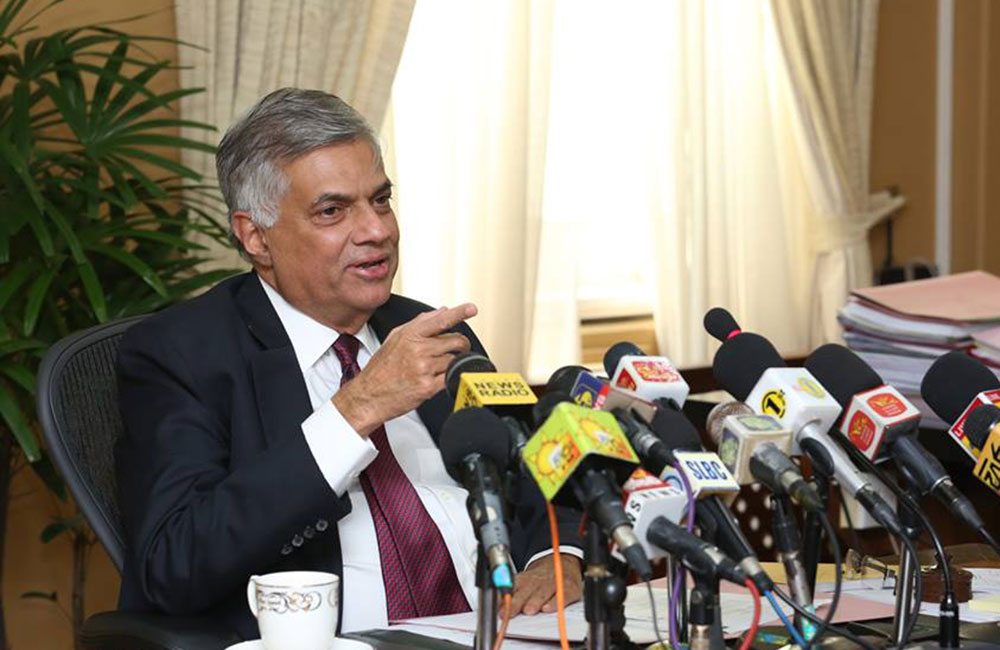Prime Minister Ranil Wickremesinghe said bank interest rates will be reduced to strengthen the Small and Medium Enterprise (SME) sector.
The Prime Minister addressing the media at Temple Trees yesterday said the Monetary Board will issue the relevant guidelines and directives in this regard by next week. Accordingly, it has been proposed to reduce lending rates by about 200 basis points.
“In view of the various submissions made by the private sector, especially by the SME sector that lending rates are very high and access to credit is difficult since banks are reluctant to provide temporary overdraft (TODs), the members of the Monetary Board, CEOs of the banks and the representatives of the Institute of Chartered Accountants were invited to a meeting to propose means of addressing these issues,” the Prime Minister said.
A working group comprising a Monetary Board Member, representatives of the banks and the Institute of Chartered Accountants was appointed to submit suggestions to address these specific issues.
“The main aim of these proposals is to ensure that the lending rates across the system reduce in an equitable manner by about 200 basis points instead of only benefitting the major corporate sector. Although no interest rate caps on lending, has been proposed by the working group at this stage, the need for it will be reviewed if the intended reductions do not take place expeditiously” the Prime Minister added.
With these measures it is hoped that SMEs will be developed parallel to the reduction of interest rates. Accordingly, it has been proposed to introduce some limitations to the interest for depositors, the Prime Minister said.
A discussion was held with financial sector officials, Finance Ministry officers and Economic Affairs Ministry officers and with Minister Malik Samarawickreme aiming to seek measures to reduce bank interest rates.”We are going to take decisions in accordance with the report we received in this regard,”the PM said.
The Prime Minister said that it is difficult to develop entrepreneurs and business entities as a result of high loan burden. According to the Prime Minister the country’s economy lost US$ 1,000 million during the 51 day rule of Mahinda Rajapaksa.
“Even though we hoped to reduce interest rates last year, due to the 51 day political crisis, it couldn’t be achieved as the country lost US$ 1,000 million. Due to the losing of US$ 1,000 million.We couldn’t achieve the target but we are in a position to reduce it now,” the PM added.
He further said that all these measures are taken while giving priority to secure the stability of the country’s economy.He added that necessary amendments are done after monitoring this process after about six weeks period.
The following recommendations have been made by the working group including imposing deposit interest rate caps on banks and revise the basis for determining the existing caps on finance companies, providing the banks the ability to define their credit policies to enable advances up to Rs.25 mn granted to the SME sector to be handled in a manner that will provide flexibility to banks to reduce the expected loss impairment charge arising from IFRS 9 for a period up to June 2020 during which time the banks will be required to validate their internal models.
In particular, the banks could have internal policies setting out the criteria for granting and extending TODs so that a mere extension of the facility would not require it to be treated as impaired if there are sufficient underline business reasons for the extension, permit deposits up to Rs.250 million from SMEs (instead of the present limit of Rs.50 mn) to be treated in a manner that will reduce the liquidity requirements required under the liquidity coverage ratio and the banks to design a revolving working capital product for SMEs to replace the TDOs and introduce risk-based pricing instead of applying the unauthorised OD rates.

Leave your comments
Login to post a comment
Post comment as a guest